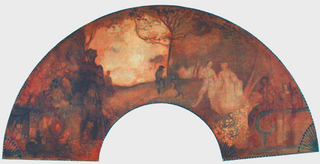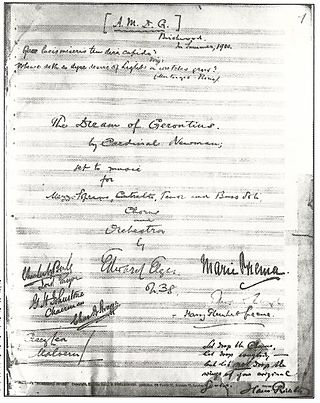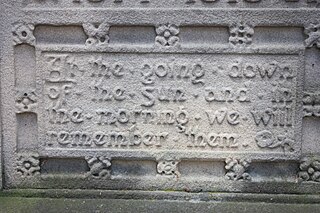
The War Requiem, Op. 66, is a choral and orchestral composition by Benjamin Britten, composed mostly in 1961 and completed in January 1962. The War Requiem was performed for the consecration of the new Coventry Cathedral, in the English county of Warwickshire, which was built after the original fourteenth-century structure was destroyed in a World War II bombing raid. The traditional Latin texts are interspersed, in telling juxtaposition, with extra-liturgical poems by Wilfred Owen, written during World War I.

Robert Laurence Binyon, CH was an English poet, dramatist and art scholar. Born in Lancaster, England, his parents were Frederick Binyon, a clergyman, and Mary Dockray. He studied at St Paul's School, London and at Trinity College, Oxford, where he won the Newdigate Prize for poetry in 1891. He worked for the British Museum from 1893 until his retirement in 1933. In 1904 he married the historian Cicely Margaret Powell, with whom he had three daughters, including the artist Nicolete Gray.

Edward Elgar's Cello Concerto in E minor, Op. 85, his last major completed work, is a cornerstone of the solo cello repertoire. Elgar composed it in the aftermath of the First World War, when his music had already become out of fashion with the concert-going public. In contrast with Elgar's earlier Violin Concerto, which is lyrical and passionate, the Cello Concerto is for the most part contemplative and elegiac.

The Sanguine Fan, Op. 81, is a single-act ballet written by Edward Elgar in 1917. It was composed to raise money for wartime charities, and after two performances in 1917 and a recording of excerpts in 1920, the score was neglected until 1973, when the conductor Sir Adrian Boult revived it for a recording. It was later staged in the theatre by the London Festival Ballet.

The Dream of Gerontius, Op. 38, is a work for voices and orchestra in two parts composed by Edward Elgar in 1900, to text from the poem by John Henry Newman. It relates the journey of a pious man's soul from his deathbed to his judgment before God and settling into Purgatory. Elgar disapproved of the use of the term "oratorio" for the work, though his wishes are not always followed. The piece is widely regarded as Elgar's finest choral work, and some consider it his masterpiece.

"For the Fallen" is a poem written by Laurence Binyon. It was first published in The Times in September 1914. It was also published in Binyon's book "The Winnowing Fan : Poems On The Great War" by Elkin Mathews, London, 1914.

The Wand of Youth Suites No. 1 and No. 2 are works for orchestra by Edward Elgar, first performed in 1907 and 1908 respectively. The titles Elgar gave them were, in full: The Wand of Youth First Suite, Op. 1a (1869–1907) and The Wand of Youth Second Suite,. The music was drawn from material written by the composer in his youth and orchestrated forty years or so later.
Antonín Dvořák's Requiem in B♭ minor, Op. 89, B. 165, is a funeral Mass scored for soloists, choir and orchestra. It was composed in 1890 and performed for the first time on 9 October 1891, in Birmingham, England, with the composer conducting.
"Pleading" is a poem written by Arthur L. Salmon, and set to music by the English composer Edward Elgar in 1908, as his Op.48.

"The Wind at Dawn" is a poem written by Caroline Alice Roberts, and set to music by the English composer Edward Elgar in 1888.
"The Immortal Legions" is a poem written by Alfred Noyes, and set to music by the English composer Edward Elgar. It was one of the songs written to be performed in the Pageant of Empire at the British Empire Exhibition on 21 July 1924.

The Fringes of the Fleet is a booklet written in 1915 by Rudyard Kipling (1865–1936). The booklet contains essays and poems about nautical subjects in World War I.

Le drapeau belge is a recitation with orchestral accompaniment written by the English composer Edward Elgar as his Op. 79, in 1917. The words are by the Belgian poet Émile Cammaerts. The poem reflects on the wartime meaning of the colours of the Belgian flag.
Une voix dans le désert("A Voice in the Desert") is a recitation, with a soprano soloist and orchestra, written by the English composer Edward Elgar in 1915 as his Op. 77. The French words are by the Belgian poet Émile Cammaerts.
Pageant of Empire is the title given to a set of songs, to words by Alfred Noyes, written by the English composer Sir Edward Elgar and given important positions in the Pageant of Empire at the British Empire Exhibition at Wembley Park.
"Big Steamers" is a poem by Rudyard Kipling, first published in 1911 as one of his twenty-three poems written specially for C. R. L. Fletcher's "A School History of England". It appears in the last chapter of the book. It is intended for children, with the verses responding with facts and humour to their curiosity about the 'big steamers' - as the merchant ships are called.
Sevillana, or, as the composer titled it Sevillaña , is a short piece for orchestra by the English composer Edward Elgar written in 1884 and published as his Op. 7. It was first published by Tuckwood, with the composer's revision of 1889 published by Ascherberg in 1895. It was dedicated to W. C. Stockley, conductor of the Birmingham Festival.
The Severn Suite, Opus 87, is a musical work written by Sir Edward Elgar. It is a late composition, written in 1930, the result of an invitation to write a test piece for the National Brass Band Championship. It was dedicated to his friend, the author and critic George Bernard Shaw.

From the Bavarian Highlands, Op 27 is a work for choir and orchestra by Edward Elgar.











